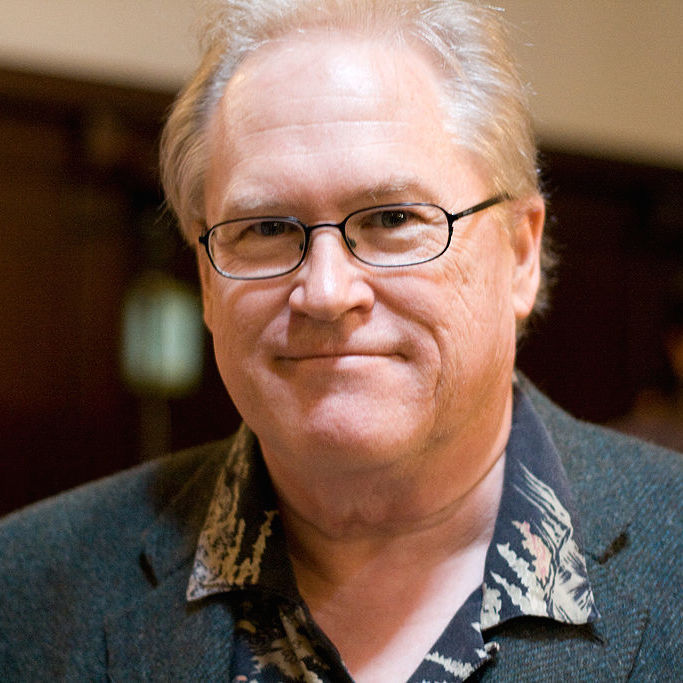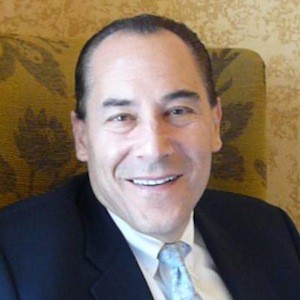Dvorak: The question, you sent some preliminary questions so I
looked at them. I was actually a writer in high school. In fact, I
think I was first published as a poet in the fourth grade, but
that’s another story. In high school, I was in the school newspaper
and then I went to the University of California Berkeley, and I was
on the Daily Cal.
I was always intending on somehow becoming a writer,
somewhere along the line, but during the last Great Depression in
the 70s, I ended up working for the government, which I didn’t
realize at the time was the perfect thing to do during a downturn.
I was writing about wine freelance here and there, but it was pre-
Parker and so it wasn’t a big thing.
John Geddes: It wasn’t ratings and…
John Dvorak: Nobody knew what they were doing. But while working for the
government, they got an HP 3000 minicomputer, and I decided this
could be useful to me to organize my life. I was going to learn how
to program it, so I took some programming classes at Cal, and then
learned some basics. I started getting interested and that’s when
the microcomputer first came out in 75, 76, 77.
77, the first West Coast Computer Fair started the ball
rolling in the Bay area. I got a Sol 20 with the North Star floppy,
and learned North Star BASIC and some other languages. I then found
there’s a lot of public domain software that wasn’t getting any
distribution, so I decided to start selling it in bunches. I
started a newsletter and then the newsletter was doing very well,
so much so I had to quit the job with the government and ended up
selling a lot of software and doing this newsletter.
It turns out that the only reason people put up with me was
because the newsletter was decent to read so I started doing some
freelance work, wrote a couple pieces for InfoWorld and something
over there happened, the editor that they had working under the
editor-in-chief was not getting along with the staff and so I came
in.
I was hired over objections of the staff because I had
become enough of an industry insider that I could get this job. It
turns out I was a natural and it turned out the only reason I was
a natural was because the previous editor was one of these mean
guys. Ever watch a football team? You have the crappy coach who
can’t get the team and then they get a good coach, a coach who is a
soft touch.
That was me. I promised everyone that they would win a
Pulitzer and I did promise that. Markoff actually was one
of my writers and he got one. But anyway, that’s where I actually
learned to write professionally. But there’s a difference
between (professional and non-professional) but you don’t know it
until you do it.
Which is, a professional writer has certain usages and
awareness, it’s just hard to put your finger on but you can
usually read it. “well this guy is a professional, you don’t like
him, but at least
he knows what he’s doing. That’s because I was working under some
very strict copy editors and also people like Markoff and Paul
Friedberg and others I would write with.
You do team writing together, and you hear “Oh, you should
never say that.” The one I remember the most that I passed along to
people, because they commonly do it, is using the word “stated.” He
stated, I’m stating something. If you put it in any copy, this is a
warning to writers out there who want to be professionals. If you
put that in there, the editor immediately thinks that you’re a rank
amateur. But there’s other things, too.
There’s a lot of stuff that’s just eye-rolling material. But
these guys enlightened me, because I was using self-referential
style, which is annoying to people that don’t do that, or
especially if they’re over-trained at the journalism school. But
anyway, while I was there, I developed a couple of columns for
myself. Then I got a couple of book deals, and I couldn’t afford to
stay there, so I left. I just kept moving, I was a freelancer and
I’ve been a freelancer ever since. That doesn’t mean I haven’t gone
to work here and there. For example, right now most of my income is
derived from new media.
That came about, about five or six years ago, when I noticed
a lot of my friends — everybody is getting fired anyway. The
magazine is going to close and this is looking grim. To be a money-
making freelance writer was not going to be easy. I decided, I knew
Adam Curry from the past because I was part of the CNET startup in
’93, ’94, something like that.
Curry was auditioning at the time, and I met him then.
I knew he was running this podcasting operation in San
Francisco called “PodShow.” I figured the only way, it’s very
strange. This was actually the strangest part of the story. You
know you can try to do podcasting, but when you go to a company and
worked there for four years as vice president of development and
you actually learn how to do it right where you learn what kind of
gear to use and you don’t make the mistakes that you are commonly
making here with your amateurish operation.
It’s quite obvious.
But I’d just like to state it. You find out that it’s not
only ridiculously brain-dead easy to do all of this stuff. But for
some reason, I don’t know what it is, but I think in a lot of
professions there’s one psychological barrier. There’s something
that you can’t get over, unless you’re pushed over or you actually
have to be for a living.
John Geddes: Once you surmount that?
John Dvorak: The joke is, it’s not much to surmount. It’s not like you
have to be a PhD to do podcasting. Now I’m still writing for PC
Magazine. I still write and I’m also a partner at New Domain and I
write for them occasionally, when I have something to say. But I’m
doing a lot of podcasting with the No Agenda show and DH
Unplugged. I work in Catalina with the TWiT.TV operation, I
do some work there too and it’s all based on my earlier
connections to the business.
It still tech-related. Generally, except the No Agenda
podcast is all politics. It’s all news deconstruction, so what we
do is we take a look at a news story and we figure out what public
relations agency might be behind it. We find out what they’re up
to, who else they represent, we put two and two together and say
this is what’s going on.
You find out a lot of NGOs are, we deconstruct them. We look
at their tax returns. We see where their money is coming from and
where it’s going and all of that sort of thing. Nobody else does
that. We’re dealing with the newspapers should be doing, generally
speaking. We have a very large audience of people that all think
that everything’s corrupt, which is what we promote.
John Geddes: You promote corruption?
John Dvorak: We promote that everything is corrupt. One of the things
I’ve done over the years, I’ve always, like a lot of normal
writers, I’ve always warmed up to public relations people and sales
people. Because I think you can learn a lot from them, not that you
should be letting them tell you what to do.
I go to the Edelman conference that they have, this big,
who’s influencing who. It’s essentially strange insiders. When I
went to this last one, I see a lot of writers that I know that are
now working for Edelman. It’s all part of this massive, native
advertising movement that’s going on with the newspapers.
To me, it’s disgusting. But you find out a lot of
interesting little tidbits, including the fact that the public
right now, in the “Who do you trust” category, the public is
trusting, not the police, not the government, not the media is way
at the bottom of the list. Lawyers and all, NGOs, top of the list.
John Geddes: Of whom they’re trusting?
John Dvorak: Of whom the public trusts. If you watch television, these
talking head shows, you see a lot of NGO guys coming around for
various organizations in one way or another. These guys are the
worst. They’re untrustworthy and if you start digging in to them,
you find the usual suspects. You find one guy is here, here,
here. And they all have an agenda, it’s horrible, so you dig into
that. It entertains a lot of people.
John Geddes: The remarkable thing about it your career writing and
commenting, is to some extent you were among the first brands in
the business as far as that.
John Dvorak: I was somewhat aware of that. In the late 70s, I had gone
to the Direct Mail Association because I was doing this newsletter
and other things and I wanted to understand more about direct
marketing. I took this three-day seminar with three different
segments. One of them included ad copywriting, but
specifically direct-mail copywriting, which I used to this day,
these techniques. The techniques of direct-mail copywriting or any
advertising copywriting is slightly different than normal prose,
because you’re selling something.
Even if it’s just an idea, the techniques to do this is skewed
just enough that it’s valuable for writers to know how it works. I
use that, it’s very effective. Before I got here, I just finished a
sales letter which I call them, we do a newsletter for the No Agenda
show that goes out twice a week, which I write, and it is a sales
pitch to support the show. It’s got news in it
too, it’s got a couple of tidbits, but generally speaking it’s ‘Hey
the show is on tomorrow can you make sure you listen.’
A lot of people, I coach
people on some of these on new media and getting them to do a
newsletter is like pulling teeth because it seems like a throwback.
you know “Email is dead and all this other crap” but it’s extremely
valuable.
We derive probably a third to a half of our income from the
results of that sales letter. But I learned that skill, too, and
that I can always fall back on. I mean, I have probably six or
seven really cool ideas that I’ve been sitting on that I know I
could direct market if I was broke but that doesn’t happen. But
yeah, I was aware of the branding thing early, and I’ve always been
aware of it to whatever extent you need to be aware of it. I think
most brand name writers are people that people know. They probably
are aware of themselves as a brand, especially book writers, they have
to be.
John Geddes: In the circles you were going in, in the technology
reporting circles, you were among the first. What’s interesting is,
let me ask you two questions. Number one, you’ve got all the skills to
manage your brand. You were never quite under the halo of another
institution.
John Dvorak: No, that was back from when I was a little kid.
Everything is all linked. When I was a little kid, a little
kid in the second grade, I was out. Are you getting any of this? Is
this thing on?
John Geddes: Yes, I’ve checked these things.
John Dvorak: By the way, this noise is just lovely for today.
John Geddes: When you’re a little kid?
John Dvorak: Second grade. I lived in a tract that was in the middle of
nowhere. It was all the baby boomers, a tract for people who came
back from World War II, flat tops. There was this one factory
nearby that a lot of people in this tract worked at. I think they
went on strike. I never even got to know then whole story. I’ve seen
this everywhere, and I noticed it even to this day.
They went on strike, somebody bitched about something, not
getting enough money, and the factory just shut down and left. All
these people were screwed because they didn’t have any secondary
source of anything. We’re getting a breeze here now, which is going
to make noise in this machine. You might want to put it down here.
Yeah, that may or may not be better.
John Dvorak: Hopefully the breeze will come and go. You need one of those
muffins. Actually, the kittens are the best for real wind. When I
was working for the government, I had no choice. But I never liked
the idea of working for one entity, so I always had multiple things
going on so if they all caved in, there had to be something, because
I liked the income stream.
That’s why I wrote so much, at some point I write every
day. Which people were always like, “How do you write so much?” I
was like, I always think of people like Herb Caen and these famous
columnists in the big newspapers that write probably 800 words, or
close to it, daily. How hard can it be?”
I mean it’s just a regimen. If you write a lot, you can
write a lot. It’s not all gold and it’s never going to be anyway.
I like to read. I read and collect essays, essays I like. In the
early days I’m
reading Camille Paglia. I’m reading her and I’m thinking to
myself, “This woman can kill an essay. She makes everyone else look
sick. It’s unbelievable how good her stuff is.” It was just
astonishing reads, it’s beautifully structured, it went on. Then I
found out it took her two months to write one of these things.
John Geddes: Yes, it’s not 800 words a day.
John Dvorak: It’s a lot different. I also have a friend who used to work
at the Wall Street Journal who always commented. He made this
comment once. He said, “Hey, we’re not Hemingway here. This is
newspaper fodder. It comes, it goes, who cares? It doesn’t have to
be that perfect.” I could never achieve that, I don’t think I could
put the time in to make a Camille Paglia essay. It’s just too much
work.
John Geddes: You want to move on.
John Dvorak: And what does sheget back from it, you know?
John Geddes: How did you keep your distance? Because you were managing
yourself, and managing your business, my brand business. How did
you keep your distance from the people you were covering, the
access mattered. How did you?
John Dvorak: I always had a bunch of theories about this and I try to
tell people this. I’m also at odds with the New York Times ethics
policies for a number of, I believe, good reasons and I’ve made
arguments about them. I could go on to it here, but I do it all the
time. One of the things I keep telling… this was mostly
regarding junkets.
I don’t think that I should be paying for, out of my pocket
or my publisher’s pocket, a junket to Korea to listen to a
brainwashing session. They should be paying me to go there, because
it’s their brainwashing session, why should I be paying to go
there? That’s what it is, it’s a brainwashing session, and I always
tell people.
The New York Times has this thing that you have to pay to
go. All these little newspapers adopted the same
policy but they could never afford to send anybody. The New York
Times had exclusive coverage. I thought this was the trick.
John Geddes: Self-interest.
John Dvorak: I had this complaint, I still have it. I always tell people
look, you’re going to go to this thing. You’re going to feel
obligated to maybe say something nice. I used to be convinced that
you should tell people that they paid your way and I’m not even
convinced that’s true anymore. You go to this thing with the
following attitude — you’re never going back.
If you write good things about them they say their job is
done, you’re done, you’re never going back. So I would even resist
doing that, which I guess pushes me in the opposite direction,
there’s an argument about that. If you write something bad about
them, you’re not going back because they think you’re a jerk for
taking their money and then condemning them.
Just be honest because you’re not going back. That’s a
fact. I’ve never been back to the same thing. I’ve been invited
here and there, and I was always freelance, so I would always take
a lot of these deals, and I would let the companies pay. The
Europeans do that, by the way, almost always.
I worked for PC Mag UK and that’s when I found out about
this. The guys said, “No, you’re not paying for that. These guys
what you to go, they can pay.” That was always my attitude and
I’ve always had this distancing thing is the question here. You can
become friends with people, and in public relations companies
that’s their goals, to make everybody their buddy. You’re friends,
and you have people like John Markoff whose rule at the Times still
is “I won’t even talk to a public relations guy.”
Because he actually does make friends of all of these old
coots in the industry and I’ve always felt that you could kind of get
to a
point making friends, but you’re never going to develop that cut-
throat type of burn-your-bridges style, which I actually like to
read and I enjoy when I see it. Because it’s a farming community,
the tech business. Everybody knows everything. They all know each
other, and they all chitchat amongst themselves.
It’s a real hard thing to do. It’s very difficult. I do it,
but what I discovered is that if you have a reputation of just
being mean-spirited and negative, which is my reputation, you can
actually be mean-spirited and negative with people that you know
and kind of get away with it. You can’t go overboard.
John Geddes: But they think it’s you.
John Dvorak: Yeah, it’s me, that’s the way that guy is. That’s kind of how
I did
it. I can’t say I get invited to a lot of dinners, but I probably
could have if I wasn’t using this trick. I used to be, when I was
the editor of InfoWorld, we used to do — This is an example of
the way we think about these things —
The problem with this magazine during this era, when it was
growing fast was the page count would jump all over the place.
InfoWorld came out weekly, which was different than working with
other types of publications, especially monthlies, and all of a
sudden you had a big hole that you had to fill.
Under my desk, I had started collecting press kits, and
press releases and essays written, it would have been like a native
ad-type material. I got the idea of soliciting this, so I would call
the public relations people and say, “You guys, your client is Seagate
right? I
need a piece on how hard disk technology is going to change within
the next 10 years”, and I’d ask them to give me a piece.
They were just in heaven. So I collected a shitload of these
things, so I would then take the piece and I would start the edit,
and I’d take every reference to the company out. Then I’d give them
to the copy editors and tell them what I wanted.
I wanted the piece to be a clean piece about what I wanted
the piece to be about, without a bunch of bull crap from whoever.
OK, so the joke, I used to do this. A lot of people, at the time
I’m sure they’d be irked if they knew this. I would occasionally,
in my office, I had a closed office, I would bring the staff in to
listen to me on a call with one of these people. They’d all be
there like this and they’d be irked because they sent me this big
piece about the company, and there was nothing about the company (in
the printed piece.) I
would apologize profusely and ask them for another piece.
John Geddes: It may have been native advertising.
You were using the source material and taking the
sources out.
John Dvorak: Taking the advertising out, yeah. I could get three pieces
out of almost anybody.
John Dvorak: That was it. After that, they figured it out. Butthere was
a lot of it, I had a stack this big of these pieces. A lot of them
were actually pretty good, a lot of these people were actual
writers and with the editing we had, it was dynamite. That kind of
thing, I’ve always been a little bit more creative because I’ve
always worked for myself as the brand. I’m always paranoid that I’m
going to lose everything. Because I’ve had a bunch of publications
pulled out from under me over the last couple of years. PC Magazine,
the print publication is gone.
One of the editors said which is why I went to new media,
I saw it coming, luckily, six or seven years ago. One of these guys
said “The problem is,
you cost too much, you’re too expensive.” I’m cheap, by the way. I’m
not an expensive writer. But in today’s world, where people are
giving it away, where they’re selling pieces for 25 bucks and the
native
advertising people are floating shit around for free. It’s
like (hard), unless you’re in Vogue or Vanity Fair or whatever, and I
think those people are doing it, too.
John Geddes: You said six or seven years ago you noticed that. What
triggered that? What was your course?
John Dvorak: That’s a good question. What got me to jump into the
podcasting? I was seeing other people doing it and they seemed to
be doing OK. I’d have to think about it, that’s a pretty tough
question. I think it was either something one of the magazines,
maybe it was when PC Magazine dropped its print edition, that could
have been it. Or it could have been, I’ve wrote for Forbes for a
while.
John Geddes: You wrote for Forbes for a while in the early part of the
decade.
John Dvorak: I was brought in for way too much money and too big of an
expense account to be kept. I knew that was a problem when I got
the job but I was brought in for a purpose. They were going to go
public as a separate operation and they never did. Then a new guy
came in from the Financial Times, he looks at me and says, “Why are
we paying this guy, this joker so much money?”
So I was out, and I had gone. Then I went over to Larry
Kramer, and I asked him for a column, he was looking for a column
in
MarketWatch, so I worked there for about six years. Then he left,
and my editor left and everybody left and it was taken over by
women and I was out.
It may be when I lost the MarketWatch job that I said,
“This is turning bad”, because it wass being run by people that I
didn’t think were very competent. Financial publications tend to be
interesting because most people don’t
understand how it works.
Fox Business is a perfect example of a company that doesn’t
get it. All companies, to be successful, and I’m not counting news
publications like the Wall Street Journal that have a lot of news
articles, but generally speaking, CNBC is successful for one reason
and one reason only. Barron’s is successful for one reason and one
reason only.
All of these people are successful because all people want are
stock tips. It’s just top to bottom stock tips. That’s all people
want to see. They just want to stare at something and do stock tip
after stock tip after stock tip. They don’t care about personal
finance or how to organize your wallet or some story about pandas
at the zoo, which is what Fox Business does, which is completely
screwed up.
CNBC is the place where the money flows, because it’s stock
tips, stock tips and more stock tips. MarketWatch, when I was
ousted, I was also noticing that they were pulling in a bunch of
content and this is going on a lot. A lot of outside content
going in, this is free material. This is like me with Info World.
John Geddes: Info World was all PR stuff.
John Dvorak: Yeah, essentially. This isn’t good. You had to go toward
the more modern things going on and that is new media. If you
really look into new media and you look at some of these kids. If
you really start searching around YouTube, you’re going to find 15
year olds, 14 year olds that have millions and millions of viewers
and subscribers and they get a big cut from Google AdSense. I was
at the races, the drag races in Sonoma with the Red Line Oil guy in
the back, because he was one of the big sponsors. We’re floating
around, and one of the drag racing guys come by. This girl comes over,
I guess
it’s his daughter and she’s like 13. She’s got heart-shaped
sunglasses and I find out she’s making like $4,000 a month because
of some piece of crap she does on YouTube. She’s making 50 grand, a
13 year old.
John Geddes: We weren’t doing that at 13.
John Dvorak: She was just so full of herself, I actually thought it was
very funny. She was a big star.
John Geddes: Now that you’ve spent a couple decades in this
business, at least.
John Dvorak: More than that. 79.
John Geddes: What’s changed in technology, what’s changed in how it’s
covered?
John Dvorak: It’s covered very poorly nowadays because what’s happened
was there’s a golden age and I believe it was from 1987 to
about 1997. Maybe a decade. That was when everything was popping.
Everybody was doing well and there were experts that were
explaining what was going on and they did a good job of it. Over
time, there was a couple of things that had happened. One is an
incursion of ”wanna-be’s,’’ I know this itsince I was a
columnist, pretty much. I did very few news stories.
Everybody wanted to be a columnist, because you got more attention
than the other guys.
You see a bunch of people coming in trying to do that, and
they couldn’t sustain, usually, because it’s more work than you
would think. Then I started noticing, and I don’t want to blame
this on the J schools or anything, but J schools have always taught
that you can be trained as a generalist and that you can do
anything.
You could go into technology, but that’s not true. In fact,
the people that can cover technology really need to be involved
enough that they can see the BS, because the scene, from the
beginning actually with Regis McKenna, who invented modern public
relations as far as I’m concerned, decided to develop this
technique of tricking people into quoting analysts that he had, in
his view, primed.
You prime a bunch of analysts. You get a journalist who
doesn’t know anything. “Here’s who you want to talk to.” Then you can
quote these people and I don’t know generally what you would call
them, but they’re acceptable to be quoted by the editors. You’ve
got the three quotes from these three different boneheads who were
pre-primed. That was what we were always fighting against
because we knew about it.
Then over time, we couldn’t fight against it anymore
because there was too much of that and not enough people that
cared. Many of the writers were sucked off into a technology
company and they got a lot of money. A lot of then disappeare,
and then they could never get.
This is an interesting group, because I knew almost all of
them. They would get frustrated by what they were seeing, because
it was a slow degradation of tech reporting into gizmos, too many
gizmos and gadgets. You could see that coming, not enough truth.
The last vestiges of real technical reporting were the EE Times,
and that was bought by somebody and the next thing you know it’s
online and nobody reads it.
It was just a slow degradation after about ’97. The
Internet came in around ’93, ’94, and then by ’95 it was starting
to catch on and by ’97, it was full hold. Now, it allowed people to
just start your own publication. Some of the best tech writers
like the Tom’s Hardware guys and these people at have specialties.
John Geddes: How do you fight against that? If we presume that that
expertise gives you that additional filter to cut out the bullshit.
John Dvorak: Right.
John Geddes: If you presume that, how do you fight out against becoming
an insider? It’s almost like there is an incestuous mentality.
John Dvorak: It is a problem, but you’re better off, I think, being
slightly an insider and being a little bit too close to stories
than being a dummy. Because then, what they really want to sell is
now, you’re giving it to the public as opposed to what you can
resist. If you’re an insider, you’re like, “This is dumb.”
-I know, but we’re trying. You should write about it.” No,
no, it’s stupid, and you can do that. They know themselves it’s
dumb and stupid, so they’re like, “OK, fine.” But I would always
try to hang out with as much of these high end guys as I could. Not
because of their companies and I would never write about the
companies, but to get the gossip.
Because if you don’t hang out with these guys, you don’t get
any gossip at all. Gossip is really “they’re doing what?” The public
is interested, no matter whether there’s technology or celebrity,
or whatever. They’re always interested. That’s why the Apple
gossip sites that are so popular. “Oh, here’s what Apple’s going to
do next!” It’s all gossip.
John Geddes: But it’s interesting that the additional thing that came in
across your term is that it went from being a cohort, tight knit.
Describe this. Who were the relationships between the journalists
themselves in the 80s like, versus the 90s, versus now? Was it
camaraderie at one point, competition at another? How did it get?
John Dvorak: It never became competition inside of a publication. In
other words, to people inside, yeah, actually there was
competition, but it was always friendly, good competition. Like
competition in a football team, where the guys are trying to be the
tight end and they compete.
The competition was there in a standard journalistic
competition, from what I can tell, in the 80s. The 90s was getting
a little scattered because of the Internet coming along, and then
all of a sudden there were people surfing the web, and there were
concerns about search engines when AltaVista finally came out with
one, and Yahoo had their directories.
It created a moment of confusion that settled out and blew
up with the dotcom thing when everyone was crazy. Now, I was doing
a TV show for about four years at TechTV, which was owned by Paul
Allen eventually. This was called Silicon Spin.
Silicon Spin was an old-fashioned discussion show that had,
there were the two wingmen and I was the guy in the middle. If you
see that today this guy is living in the 70s. Because right now,
you should put a guy on one of the sides, then you want to have a
group of three, at the most. Anyway, that was the spot.
There were these maniacs that would come on, this was in ’99.
These guys would come on and they’d talk about WebVan and how it’s
going to change the way we buy our groceries, and how this is going
to change the way we do this, the way we do that, the way we do
this, everything is going to change.
Brick and mortar is dead, stores are dead and everything is
going to be online. They were crazy. I’m thinking, “This is nuts,
this is bullshit, there’s no way this is going to happen. It’s not
going to happen. It may happen over 100 years but it’s not
happening tomorrow.” I always called these guys out, constantly.
The only interesting thing about the show is that I would do this.
I would say, “This is bull crap”, and they always had the same
response. I wrote a couple of columns about this years later, “You
don’t get it. This is the new economy. You,you don’t get it.”
OK, I don’t get it, but I still think it’s stupid. That was
giving me. It said to me that insanity had crept into the business
at all kinds of levels. I was just seeing it everywhere. I was
living in a madhouse. We went into the next decade, 2000, 2010 that
was when you had to make your move to get out of the craziness
because we had a nice crash, which pushed a lot of people out of
business. Journalists had to go work for public relations. To be
honest about it, I don’t know how they could do that, but it was
just, you know?
John Geddes: Do you think it was because of the money?
John Dvorak: Oh, yeah.
John Geddes: You were covering a sector, the people you were covering in
the course of while you were staying there is a journalists became
multimillionaires.
John Dvorak: I know. It’s funny.
John Geddes: Do you think, “Where’s mine?”
John Dvorak: I know people that do that, but they’re thinking as in,
“Where’s mine?” Because a friend of theirs just made 10, 20, 50
million dollars overnight. In the 80s and 90s, the kind of money
that people make from startups, I remember walking around with Bill
Ziff, and an editor friend of mine, Paul Somerson in New York City,
wandering around. This was in the mid to late 80s. This was when
Bill Ziff is one of eight billionaires in the world. Now there’s
800.
John Geddes: Good point.
John Dvorak: That’s what I’m thinking. There’s a couple of things, one
there is an inflation that they are not talking about, and I always
refer to it, you should check this and follow this guy,
ShadowStats.com.
John Geddes: Shadow.stats? OK.
John Dvorak: Yeah, he’s a mathematician who does real statistics. He
shows the true unemployment rate, the true inflation rate, all of
the stuff. The true unemployment rate is a lot higher than what
they tell us. Anyway, as this billionaire thing became overnight
billionaires, overnight billionaires, you start to think how can I
leverage this to a billion?
You’re a billionaire overnight, literally. It was literally
creating havoc with everybody. It’s not as though you can’t make a
decent living and a good one as a writer, if you’re productive and
you’re not an alcoholic, you’re not on drugs and you don’t do all
these things that are always problems for anybody in the arts.
I remember Jared Cornell, the novelist is a friend of mine.
I would always ask him about this, “Why don’t you go do something
with this company?” He says, “You know I like this job.”
John Geddes: That’s the difference.
John Dvorak: A lot of guys see that little thing. There’s been a couple
of writers that have made lots of money out of the blue. It’s not
that they can’t accumulate a, but just instinct, that’s the trifecta.
What the hell. He’s got 10 million dollars. It drives a
lot of people a little nutty. But I’ve always had good cash flow,
so I’ve never really worried about it.
John Geddes: The other thing about you that’s true, as an editor at that
time, people would say to you, “Tech will change the world.”
John Dvorak: Yeah, for the worse.
John Geddes: Not to curse this, but it turned from a boast.
John Dvorak: It has. For the worse. I have always said, I was doing this
from the beginning. Tech has made me successful as a writer,
because I got on it early and I stayed on it and I stayed in the
right realms to know what I’m talking about.
If I don’t know what I’m talking about, I relent and I say,
“I don’t know anything about this, so I’m not going to talk about
it.” Generally. I jump in once in a while as a mistake. But from
the early days, I have said that they should shut down the Internet
and redesign it. I’ve been saying this since about ’97.
What a joker, this guy. He’s just kidding. No, I think it’s
horrible. It’s ruined writing careers for a lot of people.
It’s also screwed up the market, the audience is all scattered now
because there’s all these online publications they cater to small
niches, very few. I mean, the New York Times is a good example.
It’s probably done the best job of hanging in there, because they
did get online and they had the online product ahead of all the
rest and they tried to get their prices up. But you just have to
wonder, at some point when are they going to pull the plug on the
print?
When they do that, print is still important. I think
print newspapers, for example, even though I subscribe every once
in a while, then I get sick of the piles and say, “Screw it.” Then
I get behind. You can’t read a New York Times subscription in
particular, even the local papers but the New York Times in
particular, if you get it daily you
can’t get through it in any reasonable way.
They start piling up, especially the Sunday ones or the
magazine. You say, “Oh, I wanted to read that.” You never do. It
produces guilt. It has all kinds of negative health benefits, so
it’s got to go.
John Geddes: Here we are on the day after the Bay Guardian announced
they’re shutting down.
John Dvorak: I did not know this.
John Geddes: Yes, announced yesterday. Now with your Bay area
history, what is your reaction?
John Dvorak: The funny thing was, I got a long lecture. There’s a group
of small newspaper guys, and the Bay Guardian was the most ironic
for a number of
local reasons you’ll never get because there were always arrogant.
There was the San Francisco
Express, that group, I think they owned the Village Voice. I don’t
know, there was a bunch of these.
I had a long discussion with one of the principles, and he
was going on and on about why they will always be in business and
he had a very unique argument that was maybe deluded. The Bay
Guardian, it seems to me would’ve fit in that model and it didn’t
because it folded. I blame a lot of this, of the folding of
print media on the advertisers. They’ve been sold a bill of goods
on the Internet and they don’t get it, and they don’t have, they’re
just completely…
I would blame, for example, the lessening impact and
influence of the big computer magazines on Intel. I blame Intel for
this whole fiasco because they stopped advertising in these
magazines and the way they used to, because they would subsidize
other advertisers in a big way, Dell would get a piece of the
action. Intel is throwing tons of money into the business, keeping
a lot of them doing well and creating a focal point of influencers
that were mostly pro-Intel.
You had all the writers in any of the magazines because
there were only a couple of chip makers, you had Intel and AMD. You
would be promotional and once they scattered on the Internet with
all these little sites and everybody saying their own opinion
then that impact was gone. That whole thing was disappearing.
And it also disappeared partially because of the editors
themselves. I always blame the editors for the demise of their own
publications, because they never adopted the diversity model where
they would really go and look at every word processor, for example,
that came out of the woodwork.
There would just be Microsoft Word, Microsoft Word and
Microsoft was never
an advertiser, to any extent, anywhere. So instead of
diversifying, instead of taking the focus off of one company and
building them up so they are so huge and they never advertise, you
might as well just shoot yourself in the foot. You should have been
talking about anything but Microsoft Word just to keep these
little companies in business.
John Geddes: Do you think that’s the original sin, in a way, was that
Chinese Wall between editorial and business? Editorial always said
don’t take the business into consideration.
John Dvorak: This has always been an interesting point of contention. It
is debatable among the various philosophies, amongst the writers
themselves
like myself. I’ve always believed that writers, and I think it’s
generally true, writers should have a self-interest. People always
say, “I
was never told by the editor not to write about this huge
advertiser, General Electric, the slam piece I could have done. I
was never told by anyone not to write about General Electric.” Of
course you weren’t, you don’t have to be. You would have to be an
idiot to write it. You don’t do these things, and most good
journalists have self-control.
They do know what’s going on, and they say, “If I want to
get fired, I’ll write about this. If I want to get called to the
carpet, I
will write about this.” Because they know that’s what’s going to
happen, so they don’t write about it. That’s the self-censorship
that takes place. Because of that, you would have to assume they have
some
thought that there is some business interests involved, it’s not
just all about them. Apparently not. I guess they thought it was about
them because they never took it one step further and said, “Why am
I writing about this one company to an excess, just because they have
their
public relations coming in and out of here daily?”
At one time, Microsoft’s public relations operation was
unbelievable. They would just talk to everybody and they were
never advertisers. That’s the joke of it, because these readers,
all you guys are is shills for advertisers like Microsoft. No.
John Geddes: You are a man with a point of view, you’ve always had one.
John Dvorak: Yes.
John Geddes: That’s good.
John Dvorak: It’s objective.
John Geddes: It’s your point of view, I’m not sure I would say it’s
objective.
John Dvorak: From your perspective, a lot of these things are probably
violations of some sort of thought process.
John Geddes: No, it’s not that they don’t quite ring true.I’ll blunt. I’m
in an
industry. You’re in an industry, you know?
John Dvorak: It’s much closer to write about real estate, but what’s
the point? I think that the New York Times in particular, even
though it had so many layers, I’ve written for them a couple
times, of edit. It was amusing. I don’t know
if they can keep that up, so they are going to have some issues
in the future. Now, you might not think writers, the argument would
be whether the writers self-censor. You would not want to ever say
that the New York Times ever did that, which is something if you
found a guy did that, they would get called to the carpet. That’s
bullshit.
John Geddes: That’s a good point of view. Here’s another question. How
well did we see, did anybody see this thing coming in to destroy
our planet? The meteor that’s called Internet, or called technology
or something.
John Dvorak: It’s the Internet, really.
John Geddes: It comes in to destroy our world. What does it say about
journalism, that in terms of our own existence, we didn’t predict
it?
John Dvorak: By the way, I have written about this, especially about the
newspapers and I have pointed the finger at the New York Times
with that same exact comment, which is these sharp operators
couldn’t even see their own demise coming and they’re giving us
advice about the world?
I’m not writing for the New York Times, I’m not writing for
a newspaper, so I can do that. If I was writing for one of them, I
probably wouldn’t do that, again self-censorship. But I think
there’s something to be said for the argument that how do you know
what happened and you didn’t see it coming because you weren’t
paying attention.
I didn’t see the iPhone coming and I was paying attention.
I have written a bunch of negative pieces about the iPhone because
I never saw once. I was goaded into it by CNBC and these other
people, because I need to
be the negative guy. Meanwhile, these other guys at CNET say,
“You’re full of crap, you don’t know what you’re talking about.”
No, it’s going to fail.
I had to eat crap for that among other gaffes. But I think
the Internet did creep up. That’s one of the problems, it just
crepped up on people, because it really started in ’69 and it was
turned over to the private sector.
John Geddes: ARPANET.
John Dvorak: It was sneaking, sneaking, sneaking and then when the World
Wide Web came along, it didn’t just take off. In fact, some people
had gone all-in early on the World Wide Web and then failed
because it still hadn’t taken off. The World Wide Web, I think it
was invented in ’89 or something, and it showed up in ’92, then it
was only on Macs and Mosaic and those browsers.
It was ’92, and it wasn’t until ’99, seven years later,
when the dotcom thing, which was all Internet-based, skyrocketed.
When that happened is the time that everybody should have gotten a
clue, because of the nuttiness and the Internet sneaking up like
this.
That’s the point. And I think right now the clueless ones are
the broadcasters. They’re in the same boat as the newspapers. The
newspapers are doing what they can and I think some will survive.
I am concerned about the pay going down for writers, the
journalists at the Times are well paid, but that doesn’t work.
The broadcasting situation is more interesting which is
why I’m in new media because now anyone can be a broadcaster.
Everything’s going to gravitate toward streaming. With newspapers,
it was cheaper to go online or magazines mainly to go online, do
your magazine there, cut costs all over the place. Because you
don’t pay for printing, you don’t pay for ink. You don’t pay for
giant presses.
John Geddes: No distribution.
John Dvorak: The New York Times has huge facilities and distribution
trucks driving around. All of that stuff, gone. Look at all the
money. The Internet takes care of it. The Internet does the same
thing to broadcasting, only the difference between broadcasting and
the newspapers, I just wrote a column about this, it runs today in
PCMagazine.
You can read it because I’m working on the speech. It says
that the impact is skewed from the newspaper, but the newspaper,
you have a business model that is completely ripped apart because
people go online, they read one or two pages, they read a couple of
stories, they’re done. With the newspaper, they’re thumbing
through, they’re seeing all these ads, it’s a different phenomenon.
With broadcasters, they probably think something like that
is going to happen, but no. With broadcasting, the Internet
broadcasting, putting the images over a Roku box like Leo does,
it’s the same exact experience to the user.
John Geddes: That’s true.
John Dvorak: Something’s on the TV, you’re watching it. The Netflix guy is
the only guy who has a clue about this. He is all over it with
those little productions. Unlike the newspapers, where you go from
a newspaper that you have to look at and it gets all over your
fingers, to an online thing.
John Geddes: The reader experience is different. With the broadcast it is
the same.
John Dvorak: It’s the same and anyone can broadcast. Now you’ve got a
situation where it’s going to develop where these guys are going
to, what I wrote about is, for example, there are old broadcasters,
Leo Laporte would be one of them, Tom Leykis, down in Los Angeles
they’ve all moved to online broadcasting.
They’re their own boss now. They can do productions the way
they want. They don’t have the suits, which is always the problem
with broadcasting, more so than in any other media. These guys,
they don’t know anything. They’re coming, “Nah, I think it should
be this way.” Those guys are going to be short-lived, the suits.
The broadcasters, they’re trying to deal with it, and they
can’t. They keep hiring these amateur new media people in there.
The pressure to say, “Yes.” The yes-man thing in a broadcasting
environment — big ABC we’re talking about, NBC — has got to be
horrible. You probably can never say what you think. I think it’s
going to be very interesting to see what happens to them.
John Geddes: What do you think happens to journalism? Are you
optimistic? Pessimistic?
John Dvorak: The thing is…I’ve always said this. I say that it’s true
with music. It’s true with art, fine arts, painting. People do
certain things because they really like it. The best journalists
have always been journalists. They like reporting. They like to go
and report.
They go digging around. They come up with stuff and then
they report on it. That’s a core group of people. They’re not going
to go away. They’re going to find some other way of surviving.
Maybe they’ll be stuffing dolls on the side, I don’t know, but
those guys never go away.
I don’t think journalism per se is going to change much so
far as news gatherers out there that do a decent job. What’s going
to change is the journalism schools that are cranking out cogs to
work in big publications, which are not going to exist. There is
going to be the New York Times, I don’t even know if the LA Times
will exist, because it’s so messed up. The Washington Post for
sure, now that Bezos owns it. That may happen to some other
publications, where a rich.
John Geddes: One of the 400 Dow, as it were.
John Dvorak: I want to call them rich fucks. Some rich fuck will buy the
place, which is not unusual. In California, the Tribune used to be
owned by Knowland, who became the governor. It used to be more that
way in the past so I think we’re going to go back to an older
model of journalism and writing where you have that. The older
model and that was the one I always thought was in play, but it’s
not, was you had a very conservative fart owning the place and
then a bunch of liberal kids trying to subvert the place. That
always made for, to me, a good newspaper.
John Geddes: It always created tension.
John Dvorak: Yeah, the tension is perfect. As opposed to everybody being
in the same boat. I’m not as pessimistic as everybody else, I just
know that this paroxysm or whatever you want to call it, this
twisted screwiness that’s going on is a dislocation situation that
is creating a dysfunction in the whole thing where it looks like
we’re all going to die. Radio changed with television, television
changed.
John Geddes: It’s all cyclical and journalism will exist.
John Dvorak: It can’t not. I know too many people that are natural
journalists.
John Geddes: They need to ask questions.
John Dvorak: They like to write it so everybody can see that they dug it
out. But J schools, I think we’ll have a problem because they’re
not teaching enough new media at all and they don’t have anyone
who can teach it. They’re still thinking they can …journalism
schools create a neutral writing person who wrote very well and
could be plugged in to any number of jobs around the industry.
They can work for the Plain Dealer, they could work for the
Times, they could work for the Inquirer whatever and they would
fit in. They weren’t training writers like myself, that’s for sure.
As everyone knows, I’m not the product of a journalism school.
I don’t have any of the earmarks, but I know what they were
doing and it was creating, it was a trade school to me. Putting
these people in these jobs. They get a desk. Right now, they have
to rethink that fast because there’s no jobs.
John Geddes: But still, at some point, Esther Dyson said that the best
thing she learned from journalism was skepticism, to check the
facts. That’s what Esther says.
John Dvorak: Esther was, one of the things you learn early on in tech
reporting is you don’t pay any attention to demos. They’re all bull
crap. I don’t care how good or cool they are, if you don’t sit down
with the product and play with it, you’re not going to get it at
all. Esther always demanded demos. This was a matter of point.
Esther, I love you, you see this. I do know Esther quite well, but
she always demanded demos.
John Geddes: I’m sure. I have to thank you, this is been a wonderful
chat.
John Dvorak: I don’t know if it did any good.
John Geddes: You know it did. Trust me.
John Dvorak: Don’t tape over that. That’s got an HD disk and a card in
it, right?










